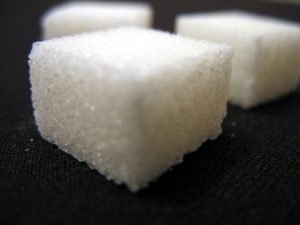This post is also available in Dutch .
Parents often try to prevent their children from becoming hyperactive by limiting their sugar intake. According to science, however, sugar has no effect on hyperactivity. Donders researcher Erik Meijs explains.
 Sugar does not make children hyper.
Sugar does not make children hyper.
Foto Uwe Hermann (CC BY-SA 2.0).
You have probably often heard parents say they don’t allow their children too much candy because sugar makes them hyperactive. Since sugar obviously is important fuel for your body, it’s not so strange to think more sugar leads to more hyperactivity. However, research has shown that this is not how it works.
Sweet sugar research
The best way to investigate whether sugar intake makes children hyperactive, is to set up a double blind placebo-controlled study. Essentially this means that you (1) give some children sugar and some a placebo, usually an artificial sweetener and that (2) everybody involved in the actual experiment, including the children, parents and researchers, should not know whether or not the child received sugar.
Once these conditions are met, we can observe children and have them do tasks to see if there is any difference between the group of children that got sugar and the group that didn’t. A large analysis that combined the results of more than ten of such studies showed that there are no general effects of sugar on the observed behavior or performance of children during cognitive tasks 1. In a similar investigation, the effects of a three-week high-sugar diet was observed, and also no effects of sugar on behavior or cognition were found 2.
Parents make their children hyper
In another study all children were given an artificial sweetener. However, some of the children’s parents were told that their child was given sugar. When the parents had to rate their child’s behavior, parents who believed their child had gotten sugar rated their children as being more hyperactive. Video recordings of the parent-child interactions revealed that it was actually the parents who behaved differently towards their children when they thought they had received sugar, and thus expected their children to be hyperactive 3. There seems to be a self-fulfilling prophecy causing parents, and probably children as well, to behave differently when they think they have eaten or drunken something with sugar in it.
When considering all of the above, these findings do not imply that parents can just give their children as much candy as they want. Sugar intake should still be limited because high sugar consumption relates to health problems like tooth decay, obesity and diabetes. Furthermore, it should be noted that there is no consensus so far about the possible effects of other ingredients found in candy, such as colorants or preservatives, on children’s behavior. Nevertheless, the idea that sugar makes your child hyperactive is a myth, and thus denying your child candy for that reason is false, and perhaps even unnecessary.
This blog was written by Erik Meijs. Edited and translated by Jeroen.
More information:
1 http://jama.jamanetwork.com/article.aspx?articleid=391812
2 http://www.nejm.org/doi/full/10.1056/NEJM199402033300501
3 http://link.springer.com/article/10.1007/BF02168088
